Featured
How Climate Shaped Our Minds—and How It Might Still Save Us from Climate Change
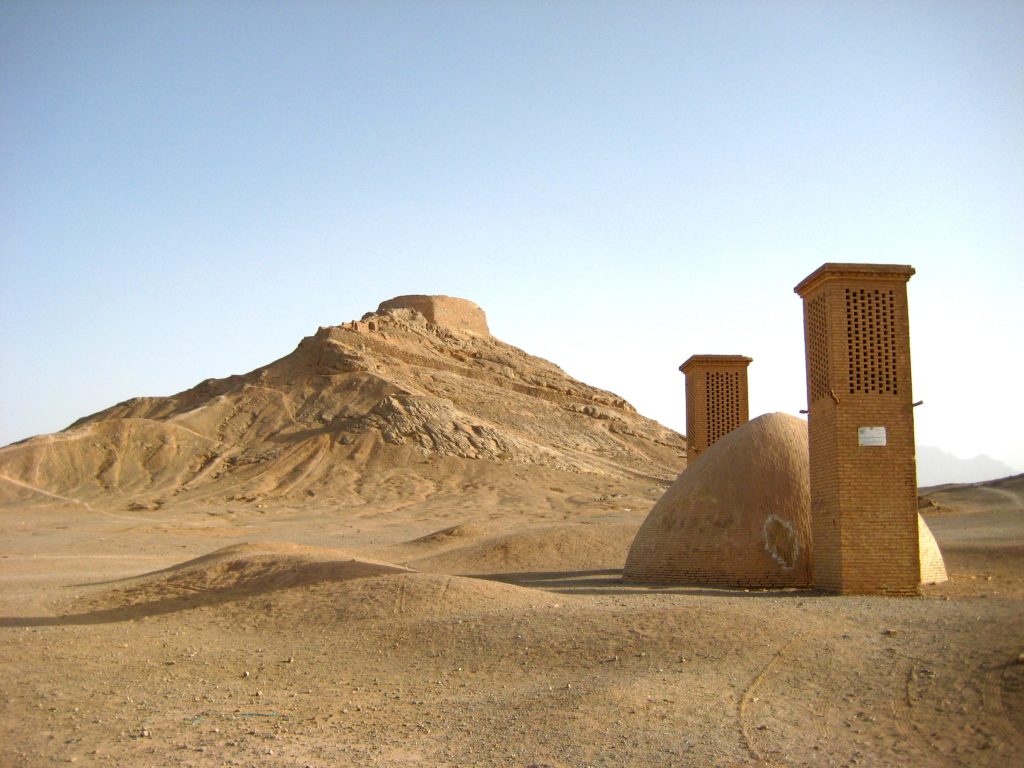
Image above: Towers of Silence, Yazd, Iran. Taranis-iuppiter, CC BY-SA 3.0, via Wikimedia Commons
Two cities, two perspectives on life • Why water scarcity might shape long-term thinking • Putting water scarcity to the test • Water scarcity shapes job preferences • A global phenomenon? • Is it an accident Islam was founded in a desert? • Water is not wealth • Can water scarcity change minds? • Hope for humanity?
A few years back, a friend invited Hamid to a Friday night party. The host was a young guy from Shiraz, and he graciously offered everyone a glass of wine from his personal winery to celebrate the weekend.
But one of the guests, a man from nearby Yazd, politely declined the offer. Hamid’s Shirazi friend encouraged him. “Relax. Life is short. Let’s embrace this joyful moment.”
Hamid’s Yazdi friend was defiant. “It’s not just a glass; it’s a slippery slope. I’m afraid I can’t indulge because staying up late will hurt my productivity tomorrow.”
The disagreement highlighted two approaches to life. One mindset is to live in the moment and revel in life’s pleasures. The opposing mindset is to make sacrifices now to invest in long-term gains. These two friends had no idea that their brief disagreement would send us on a path of years of research into their minds.
Two cities, two perspectives on life
That disagreement seeded this research project because Hamid suspected there was more than a personality difference here. Hamid suspected it wasn’t a coincidence that the abstainer was from Yazd and the indulgent host was from Shiraz.
Yazd and Shiraz are two nearby cities in Iran. They’re near each other but have opposite reputations. Shiraz is the namesake of the wine known around the world, and it has a reputation for poetry, romance, and the arts. Its streets are lined with gardens. Flowers bloom, and fruit grows on trees.
A few hours northeast lies Yazd. Yazd is known as a city of hard work, devotion, and self-restraint. Yazd is where instant gratification goes to die.
Why water scarcity might shape long-term thinking
The other defining difference between Yazd and Shiraz is their climates. They have roughly the same temperature, latitude, and elevation. But Shiraz has plentiful water, whereas Yazd is dry.
At that Friday night party, Hamid wondered if the opposing climates shaped the two areas’ opposing reputations. The idea is simple. Water is a fundamental human need. If water is scarce, cultures instinctively adapt by emphasizing thrift, saving, and prohibiting indulgences. If water is plentiful, cultures may feel they have enough of a backup to enjoy life and leave tomorrow’s concerns for tomorrow.
Over generations, cultures develop customs, habits, and values that are adapted to water scarcity. That means cultures may still embrace long-term thinking, even in a world where many people don’t think about the water coming out of their modern faucets.

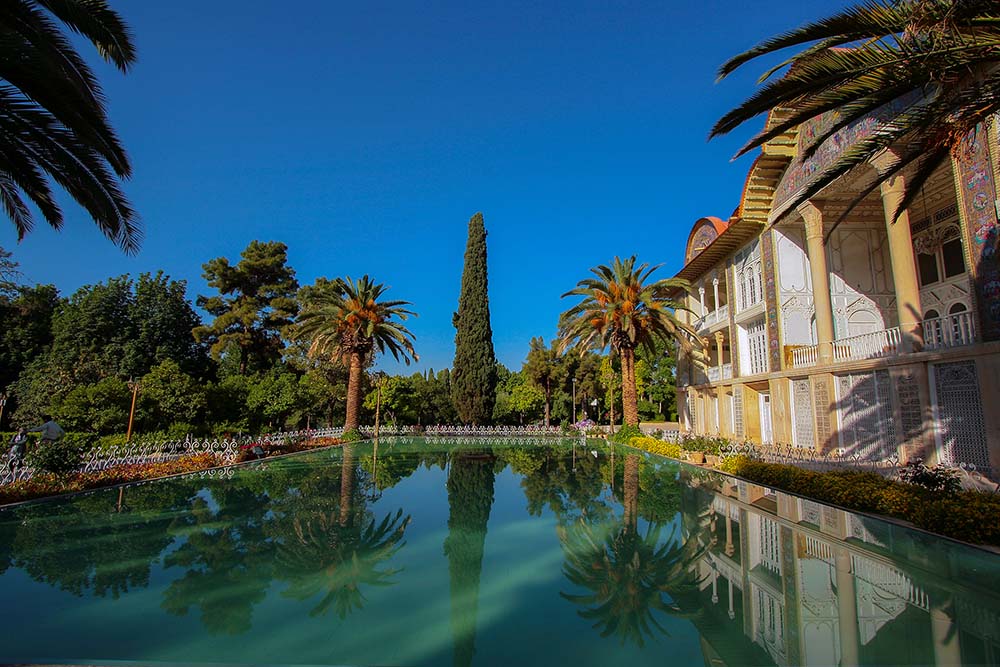
Putting water scarcity to the test
We started by testing people from Yazd and Shiraz. We wanted to know whether the disagreement at the party reflected larger attitudes in these two places or just two personalities.
We recruited 300 people in Yazd and Shiraz and asked them questions about long-term thinking. For example, they rated how much they agreed with the statement, “Persistent efforts are the surest way to results.”
We also asked about indulgence. We asked about the importance of values like “moderation: having few desires” and “keeping time free for fun.” Sure enough, people from dry Yazd agreed more with long-term thinking, while those from rainy Shiraz agreed more with indulgence.
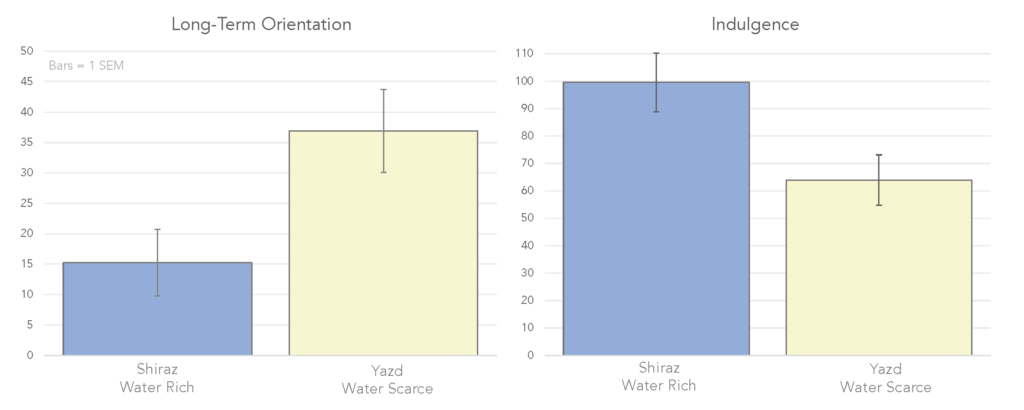
We tested whether individual differences like gender or age could explain the differences between the two places, but they could not. And the fact that the two cities are near each other helps rule out many alternative explanations. Yazd and Shiraz are similar in terms of urbanization, GDP, language, religion, literacy, and ethnicity. Even temperature is similar. The biggest difference is water.
Water scarcity shapes job preferences
Despite these results, we still worried that people’s survey responses might not reflect reality. Survey responses do not always correspond to behavior, but we were particularly worried because Yazd and Shiraz have popular reputations for these traits. We wanted to know if we were tapping into real differences or just popular stereotypes?
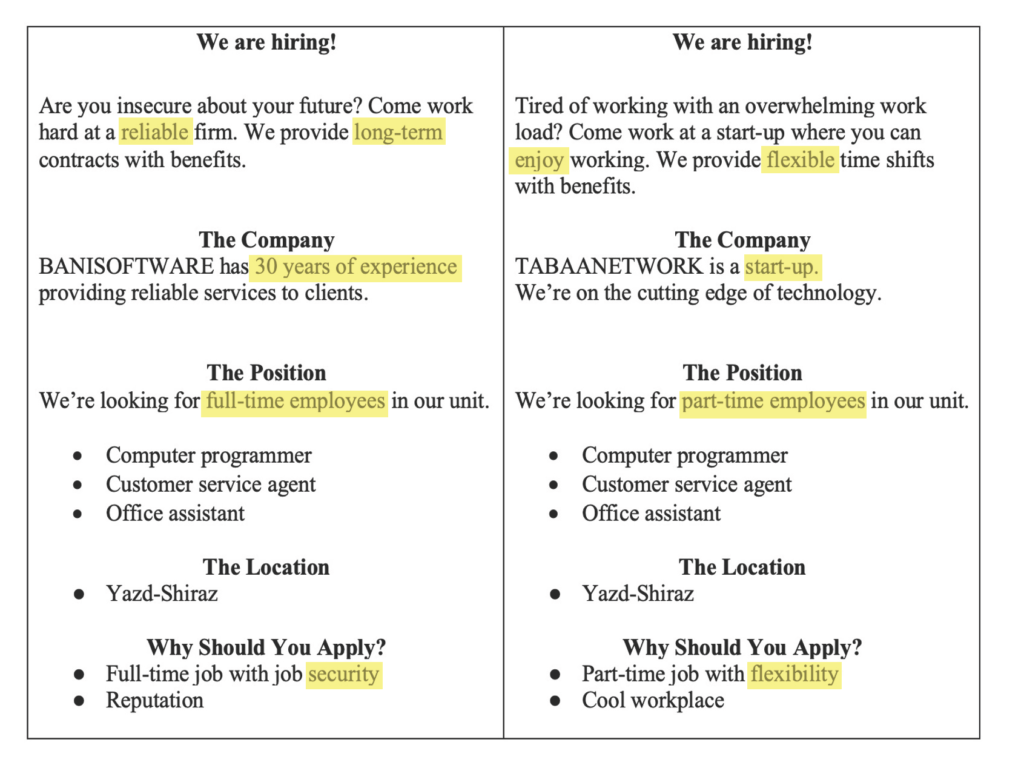
To test whether these differences corresponded to people’s real behavior, we ran a field study. We created two job listings for nearly identical jobs on one of Iran’s most-visited websites. One was for a stable, long-term position at an established company. The other was for a flexible, part-time job at an exciting startup.
We set up separate email addresses to monitor the résumés coming in for the two companies, and we waited to see how many people applied. After two weeks, we counted the résumés and saw complete opposite preferences. Applicants from water-rich Shiraz sent more résumés for the exciting startup. Applicants from Yazd sent more résumés for the stable company.
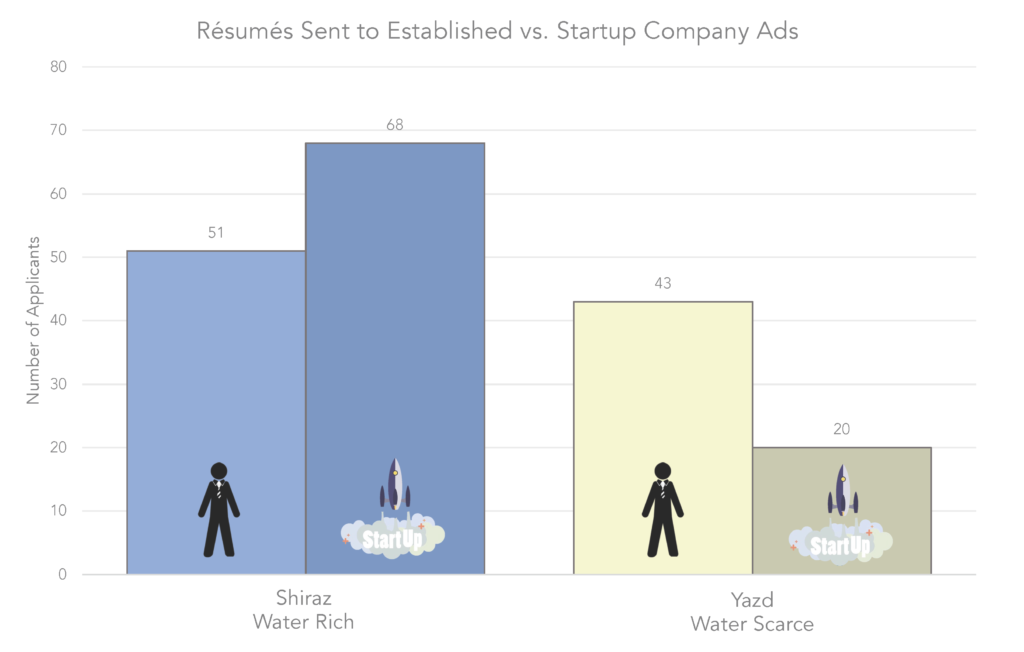
A global phenomenon?
Seeing evidence of the distinct mindsets in actual behavior made us more certain we were onto something beyond popular conceptions. We had evidence of cultural differences between dry and wet climates. But we still wondered whether this story was unique to Iran.
There’s good reason to think that water might play a bigger role in Iran overall than in other countries. Sure, water is fundamental to all human life, but Iran is 20% desert, and much of the rest of the country is susceptible to desertification (land degradation in dry areas). We wanted to know if we had overestimated the effect of water availability on values because we studied it in Iran.
So we expanded the study to the wider world. We used data from a survey of long-term thinking and indulgence in 82 societies around the world. People in different societies rated the same values as the original study participants in Yazd and Shiraz, such as the importance of “keeping time free for fun” and “thrift (not spending more than needed).”
We compared indulgence and long-term thinking with how much freshwater those places had historically. We used historical data because our theory is that the climate affects cultures over the long run, and those cultural habits have inertia.
Water availability seemed to matter. Even comparing societies with the same levels of wealth and education, people in places with a history of abundant water tended to think less about the long term.
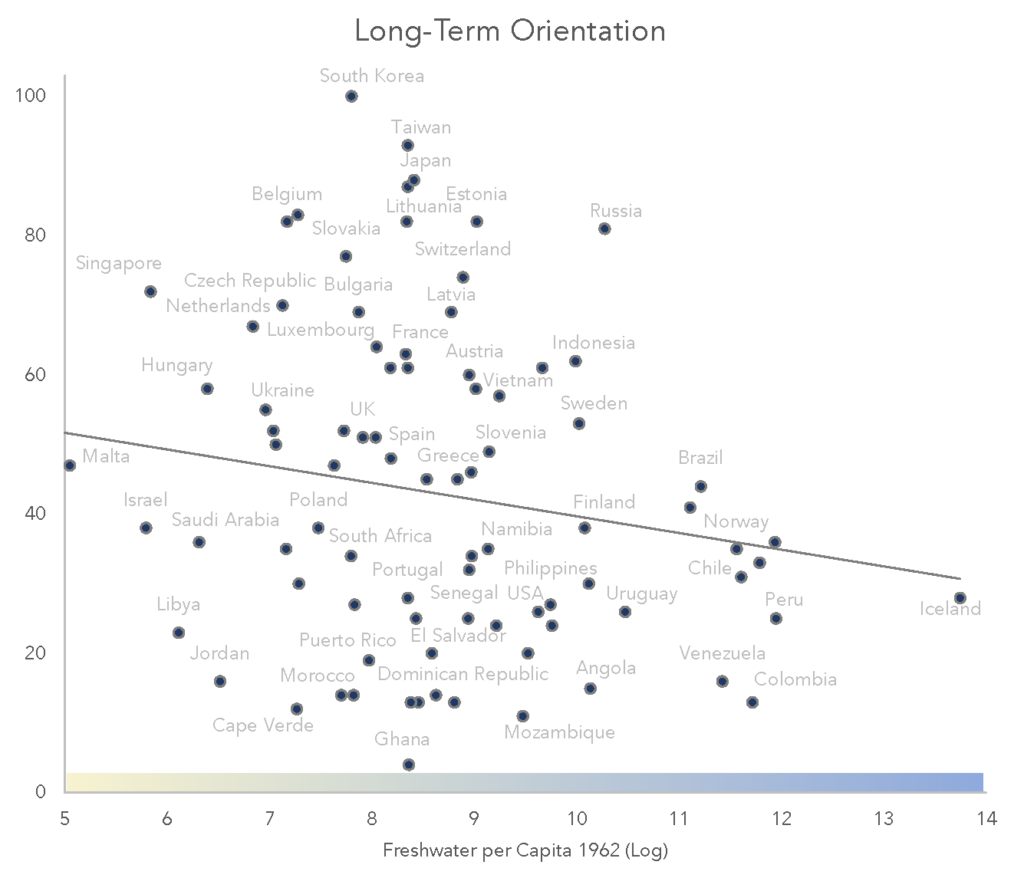
When we looked at indulgence, the picture was flipped. Places with plentiful water tended to agree more with the value of having fun and living in the moment.
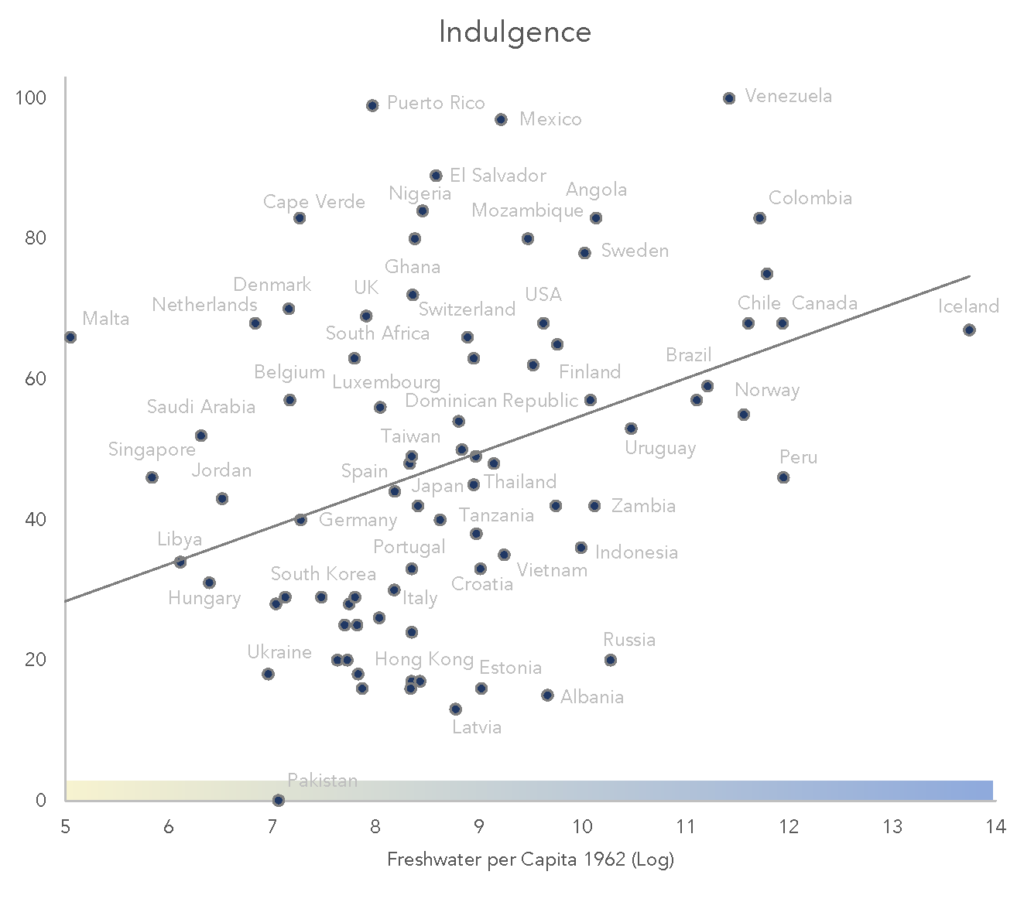
We also tested the idea that climate over the long term has a bigger effect on culture than short-term climate conditions. To do that, we tested societies’ freshwater historically versus currently and found that their history of freshwater explained cultural differences better than their current water situation.
Is it an accident Islam was founded in a desert?
Religion is a plausible alternative explanation. Many of the world’s driest places are home to Islam, which has strict codes to rein in desires for alcohol, food, and sex. This raises the question of whether water scarcity is confounded with Islam.
To test this, we compared the percentage of the population that is Muslim across societies. There was some evidence that religion mattered. For example, Muslim societies tended to disagree with indulgence, an attitude that seems to fit with the strict prohibitions of Islam.
Yet the data showed that water availability was important beyond the presence of Islam. For example, we tried comparing only non-Muslim societies. Even in this smaller sample, places with water scarcity were still more long-term oriented.
However, the connection between water and Islam raises the intriguing question of whether religion is really a confound at all. Perhaps it’s no coincidence that Islam formed in an arid landscape. Islam’s prohibitions on drinking, gambling, and sex may have been extensions of an adaptive mindset in environments where water is dangerously scarce.
Water is not wealth
A careful reader could look at our findings and think, “We already know this. It’s easy. Water is wealth! Water is like gold bars or dollars in the bank. And when people have more wealth, they live in the moment. When they are poor, they plan for the future.”
That is logical, but the data contradict it. Water is not wealth. For one, we can compare economic wealth with long-term thinking. If anything, people in wealthier countries tended to think more for the long term than people in poorer countries. But water showed the opposite pattern. “Water wealth” was linked to less long-term orientation.
Of course, long-term thinking could create wealth too. One reason economists study long-term thinking is that it is correlated with saving money and investing in education. That makes it difficult to puzzle out whether wealth gives people the breathing room to think for the long term—or, alternatively, if long-term thinking makes people wealthy.
One way to overcome this tricky problem is to randomly make people wealthier or poorer in the lab. Researchers did just that by having participants play economic games and rigging the game to make people temporarily wealthier or poorer. Then they tested how well the participants planned over many rounds of the game.
Read all of the articles from the September/October Observer.
After people became poorer, they started to make more short-term decisions and neglect future costs. Those decisions ended up making them worse off in the long run. In other words, even when we have clean control over causality in the lab, the effects of wealth are different from the effects of water.
Water availability and wealth seem to trigger different reactions in our brains. Poverty leads to short-term thinking, but water wealth does the same. It could be that evolution equipped us with adaptive responses that are specific to water conditions.
This theory might seem far-fetched, but it makes sense given the fact that water is so fundamental to human life. Humans can live for 2 months without food but usually just days without water.
Our noses may be adapted to water too. Sharks are famous for detecting a tiny amount of blood in water, but humans are even more sensitive to scent of fresh rainfall. Some people have speculated we evolved a sensitivity to the smell of rain because it helps us find water. How far-fetched is it to think that our minds are adapted to have specific responses to going without water?
“Nothing is more useful than water: but it will purchase scarcely anything.”
Adam Smith, Wealth of Nations.
Can water scarcity change minds?
Up to this point, our story has been one of history. But climate change may be overturning that history. Climate change is bringing both historic rainfall and historic droughts. If our brains are adapted to be sensitive to water scarcity, could climate change be changing our mindsets too?
This might seem like a contradiction. Our theory was based on the idea that what matters is the long-term environment. Cultures have inertia. We found that historical water conditions explained cultural differences better than current water conditions. So if long-term conditions are what matters, is it even possible that changes in just the last few years could make a difference?
We think both matter. Human cultures build customs and attitudes that accumulate and solidify slowly over generations. But humans are probably also acutely sensitive to the need for water right now.
Lactose tolerance works that way. Cultures like Denmark raised cows for milk over many generations, and they eventually built up the ability to digest milk into adulthood. That experience culminated in Danes’ inborn ability to tolerate milk better than most humans. That’s the long-term accumulation.
But recent research has found that people can also lose that tolerance after short-term changes. If people stop drinking milk, their bodies lose bacteria that help digest milk. They become more likely to experience symptoms like diarrhea when they drink milk again. Similarly, people can start building up tolerance to milk and decrease unpleasant symptoms in as little as 2 weeks. That’s the short-term reaction. In other words, humans have both accumulated inertia and the ability to react to changes.
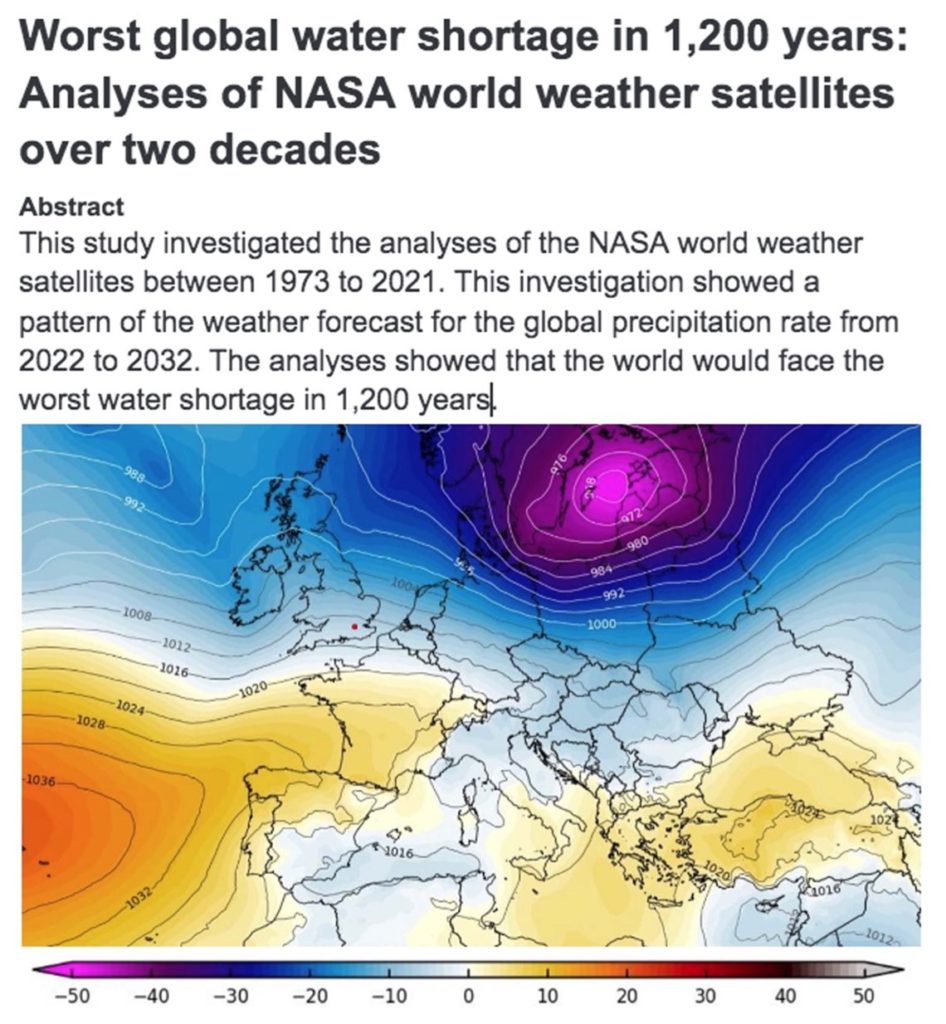
After we documented the long-term effects of water scarcity, we wanted to know whether the short term matters too. To do that, we ran an experiment. We invited college students into the lab and gave them an article to read about climate change.
Some participants read an article that reported on the latest science predicting increasing rainfall. Other participants read an article that reported on increasing drought. That headline was as scary as the reality is: “Worst global water shortage in 1,200 years: Analyses of NASA world weather satellites over two decades.”
After participants read their respective articles, we asked them how important it was to think for the long term versus enjoy life and live in the moment. Participants who read about water scarcity embraced long-term thinking. Participants who read about water abundance—even though it is caused by climate change—reacted by favoring living in the moment.
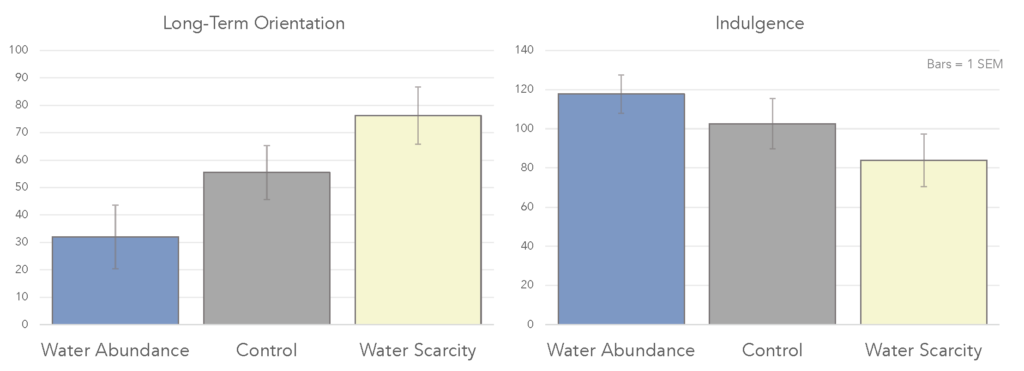
Hope for humanity?
Psychologist Dan Gilbert has argued that our brains are not evolved to deal with a threat like climate change. The idea is that our brains are great at responding to threats like a caveman swinging a stick or a lion searching for a meal, but climate change is tricky because it’s a slow-moving threat that doesn’t have intentions.
That makes for a pessimistic story. It sounds like humans don’t have the right mental equipment to deal with climate change. Yet our data suggest reasons for hope. Faced with imminent water scarcity, people respond by thinking more for the long term.
That long-term thinking could be just what we need to stop climate change. We cannot win the fight against climate change in a month or a year. But if we can make short-term sacrifices for long-term gains, we can make the investments needed for real change. Thankfully, human brains seem to be prepared to do that. The cultural values that aided human adaptation to environmental threats in the past may also help us tackle the world’s most significant environmental challenge of the future.
Feedback on this article? Email apsobserver@psychologicalscience.org or login to comment. Interested in writing for us? Read our contributor guidelines.
Ball, R. (2022). The smell of rain. Londolozi Blog. https://blog.londolozi.com/2022/01/17/the-smell-of-rain/
Beall, A. (2020). How long can you survive without water. BBC. https://www.bbc.com/future/article/20201016-why-we-cant-survive-without-water
Campbell, H. (2018). Geosmin: Why we like the smell of air after a storm. American Council on Science and Health. https://www.acsh.org/news/2018/07/28/geosmin-why-we-smell-air-after-storm-13240
Cawdrey, K., Carlowicz, M (2023). Warming makes droughts, extreme wet events more frequent, intense. NASA. https://web.archive.org/web/20230620165433/https:/www.nasa.gov/feature/warming-makes-droughts-extreme-wet-events-more-frequent-intense/
Eskandari D.H., Gholami, H., Telfer, M.W., Comino, J.R., Collins, A.L., & Jansen, J.D. (2021). Desertification of Iran in the early twenty-first century: assessment using climate and vegetation indices. Scientific Reports, 11, 20548. https://doi.org/10.1038/s41598-021-99636-8
Ferro, S. (2013). What are the most lactose intolerant places in the world? Popular Science. https://www.popsci.com/science/article/2013-08/infographic-day-where-people-can-digest-milk/
Figlio, D., Giuliano, P., Özek, U., and Sapienza, P. (2019). Long-term orientation and educational performance. American Economic Journal: Economic Policy, 11(4), 272-309. https://doi.org/10.1257/pol.20180374
Fox, A. (2020). How rain evolved its distinct scent—and why animals and humans love it. Smithsonian Magazine. https://www.smithsonianmag.com/smart-news/smell-rain-explained-180974692/
Holden, C. & Mac, R. (2009). Phylogenetic analysis of the evolution of lactose digestion in adults. Human Biology, 81(5/6), 597–619. http://www.jstor.org/stable/41466630
Hosie, R. (2018). Cutting out dairy can make you lactose intolerant. The Independent. https://www.independent.co.uk/life-style/health-and-families/dairy-cut-diet-lactose-intolerant-symptoms-development-skin-cheese-milk-yoghurt-a8302626.html
Kottusch, P., Tillmann, M., Püschel K. (2009). Survival time without food and drink. Arch Kriminol, 224(5-6), 184-191. https://pubmed.ncbi.nlm.nih.gov/20069776/
NPR (2019). Why climate change threats don’t trigger an immediate response from human brains. https://www.npr.org/2019/12/12/787552712/why-climate-change-threats-dont-trigger-an-immediate-response-from-human-brains
Purdue News Service (1997). Lactose-intolerant people should drink more milk, experts say. https://www.purdue.edu/uns/html4ever/1997/9712.Savaiano.intolerance.html
Shah, A.K., Mullainathan, S., Shafir, E. (2012). Some consequences of having too little. Science, 338(6107), 682-685. https://doi.org/10.1126/science.1222426

 Thomas Talhelm is an associate professor of behavioral science at the University of Chicago Booth School of Business
Thomas Talhelm is an associate professor of behavioral science at the University of Chicago Booth School of Business




APS regularly opens certain online articles for discussion on our website. Effective February 2021, you must be a logged-in APS member to post comments. By posting a comment, you agree to our Community Guidelines and the display of your profile information, including your name and affiliation. Any opinions, findings, conclusions, or recommendations present in article comments are those of the writers and do not necessarily reflect the views of APS or the article’s author. For more information, please see our Community Guidelines.
Please login with your APS account to comment.